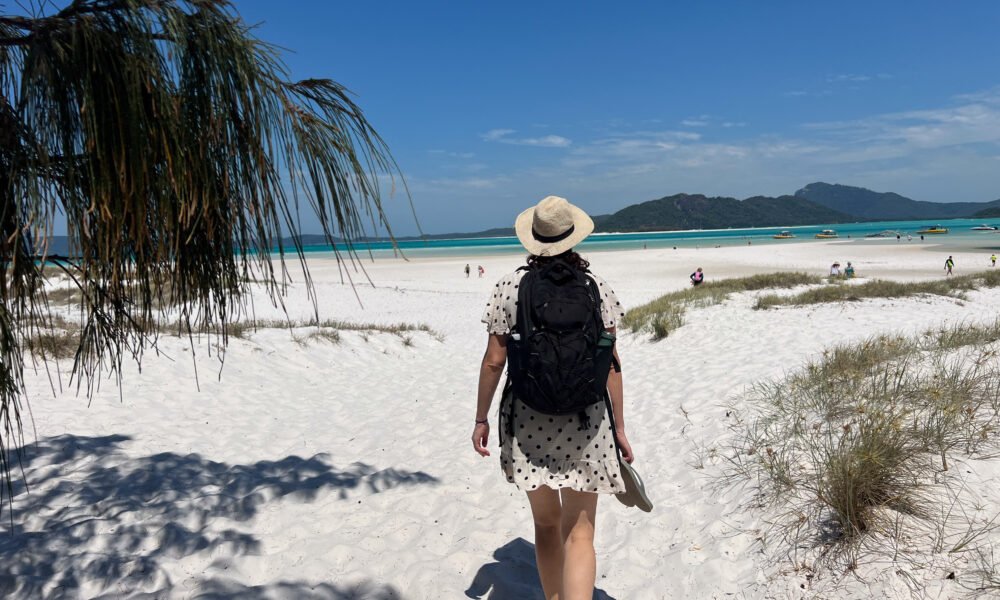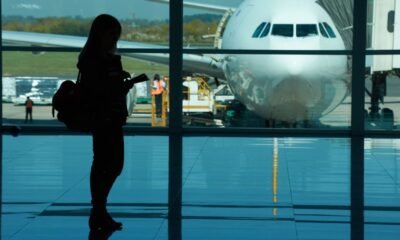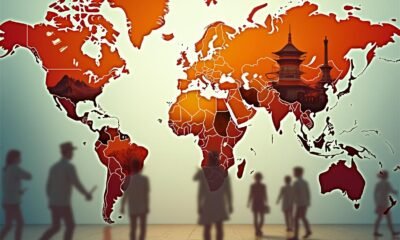Wellness Travel
How the Gulf could emerge as a global hub for wellness travel
The travel industry is undergoing a profound transformation. What was once a sector dominated by leisure, sightseeing and business conferences is now being reshaped by a more purposeful motivation: wellness.
According to the Global Wellness Institute, wellness tourism is set to more than double in value from $651 billion in 2022 to a projected $1.4 trillion by 2027, growing at a compound annual rate of 16.6 per cent. This is not a passing fad – it is a structural shift that signals how we, as a society, are redefining the value of travel.
At its core, wellness tourism is the intersection of travel and self-care. It spans far more than detox retreats or luxury spa getaways. Today’s wellness-seeking traveller is just as likely to be on a silent meditation retreat in Bhutan, as attending a biohacking clinic in Switzerland or participating in a movement-based therapy programme on the beaches of Oman. The motivations are varied and include mental resilience, physical renewal as well as emotional healing – but the economic impact is universally clear: wellness is now a defining force in global tourism.
This trend has been accelerated by several macro forces. First, the long tail of the Covid-19 pandemic has left a deep psychological imprint. The isolation, disruption and stress of those years have triggered a mass re-evaluation of lifestyle choices. Consumers are now allocating time and money towards experiences that offer restoration – not just recreation.
Second, demographic shifts are at play. Millennial and Gen Z travellers, who now form the bulk of global travel demand, prioritise holistic well-being as a central part of their identity. This is the first generation for whom vacationing and healing are not mutually exclusive. Finally, digitalisation has enabled travellers to discover, plan and access highly personalised wellness experiences at scale.
The Middle East, and the Gulf in particular, is uniquely positioned to benefit from this surge.
The region has invested heavily in high-end hospitality infrastructure, but until recently, much of this was aimed at luxury leisure and business travel. The wellness economy presents a compelling adjacent growth opportunity. Destinations like AlUla in Saudi Arabia, the Hatta Mountains in the UAE and Oman’s Dhofar coast offer natural settings that are ideally suited for immersive wellness experiences. Coupled with strong air connectivity, an increasingly diversified hospitality sector and supportive policy environments, the Gulf could emerge as a global hub for wellness travel.
But capturing this opportunity will require more than beautiful resorts and Instagrammable yoga decks. The winners in this space will be those who take a systems-level view.
First, cross-sector collaboration is key – linking tourism boards, healthcare providers, tech firms and the hospitality sector to create integrated offerings. Second, data and personalisation will be critical. Wellness is not a one-size-fits-all proposition. Travellers expect experiences tailored to their biometric data, lifestyle habits and cultural context. Third, credibility matters. As wellness tourism grows, so too does scrutiny. Governments and operators must ensure that standards are rigorous, claims are evidence-based and that wellness does not become an empty marketing slogan.
At its core, wellness tourism is the intersection of travel and self-care
There are also implications for the workforce. Wellness tourism demands a new breed of professionals – holistic health practitioners, mindfulness coaches, fitness experts and traditional medicine therapists – all of whom must be trained, accredited and fairly compensated. This presents an opportunity for regional economies to invest in human capital, diversify employment and foster innovation within the broader health and hospitality ecosystem.
From an investor’s perspective, the sector’s performance is increasingly compelling. Studies have shown that wellness travellers typically spend 35-45 per cent more than the average international tourist. And unlike mass-market tourism, wellness offerings tend to be high-margin, low-volume and less seasonally volatile – an attractive proposition for developers, sovereign wealth funds and private equity alike.
What’s more, wellness tourism aligns closely with the rising demand for ESG-aligned investments. Sustainable resort developments, nature-based retreats and culturally rooted healing traditions offer not only strong financial returns but also measurable social impact. As institutional investors look to diversify their portfolios with purpose-driven assets, wellness tourism presents a rare confluence of profitability, resilience and long-term relevance.
In a fragmented and volatile world, people are searching for meaning, balance and connection. Wellness tourism is not just a product category; it is a reflection of deeper societal desires. For the Gulf, this is a chance not only to capture economic value but to shape the global narrative around what purposeful travel looks like in the 21st century.
The destinations that embrace this shift – with authenticity, strategy and bold investment – won’t just attract travellers. They will build ecosystems of health, resilience and renewal that transcend tourism altogether.
Wellness Travel
IT&CMA 2025 in Bangkok to Promote Wellness, Sustainability, and Smarter Travel for MICE and Corporate Travel Sectors

Thursday, July 24, 2025
The IT&CM Asia and CTW Asia-Pacific 2025 will once again visit Bangkok, from September 23 to 25 this year to bring under the same roof MICE (Meetings, Incentives, Conferences and Exhibitions) and corporate travel industry professionals.
Taking place at the Bangkok Convention Centre at CentralWorld, the co-located shows will have an increased emphasis on wellness, travel and doing business, with a raft of comprehensive educationals and networking events.
IT&CMA 2025 will see the convergence of regional and international MICE professionals, offering a platform for three days of learning, collaboration, and knowledge exchange. The conference promises to set the benchmark for thought leadership and discussions surrounding the future of business travel, with a particular emphasis on how sustainability and wellness are reshaping the MICE industry.
A key highlight of the event is the MICE Fundamentals: Conferences, Exhibitions & Incentive Events certification course, organized by the Global MICE Collaborative. This course will offer delegates the chance to enhance their professional skills through expert-led instruction, in-depth case studies, and useful planning resources. By building a strong foundation in emerging MICE markets, this course aims to prepare professionals for the evolving needs of the industry.
The conference agenda includes several hands-on workshops aimed at fostering a deeper understanding of sustainable practices within the MICE industry. One such workshop is the Sustainable Gastronomy in MICE initiative, led by the International Congress and Convention Association (ICCA). This workshop will explore sustainability and creativity in event design, with food serving as a medium to understand how both can be integrated into the MICE experience. Additionally, discussions on resilience in business travel will be a major topic during CTW Asia-Pacific, which will delve into sustainability, policy evolution, and the growing importance of traveler well-being.
The opening keynote of the conference will feature a discussion on wellness in business events, specifically focusing on the newly launched “MEET WELL” campaign by TCEB (Thailand Convention and Exhibition Bureau). This initiative addresses the growing demand for wellness integration, seamless connectivity, and outcome-driven event strategies. Wellness will also be a recurring theme throughout the event, with a special focus on integrating mental and physical well-being into the corporate travel and MICE experiences.
Mindfulness will also be integrated into the agenda with a special Your Smiling Heart meditation session, led by Dr. Buathon Thienarrom. This 10-minute mindfulness exercise is designed to provide delegates with a moment of calm amidst the bustle of the event, encouraging participants to connect inwardly and recharge. These wellness initiatives reflect the increasing importance of mental health in the workplace and corporate events.
Another exciting feature of IT&CMA 2025 will be the Tastebud Lab Conference, a roundtable discussion that explores how food and nutrition are becoming drivers of innovation in MICE, health tourism, and hospitality. This session will examine the evolving role of food in creating engaging event experiences and fostering better health and well-being for attendees.
To facilitate efficient business networking, the event will include a fast-paced “speed-dating” segment for buyers and exhibitors to exchange leads. This format allows for quick and meaningful connections between event organizers, travel planners, and suppliers, maximizing business opportunities in a short amount of time.
IT&CMA 2025 has gained support from a network of prominent industry partners, including the Thailand Convention & Exhibition Bureau (TCEB), IAEE (International Association of Exhibitions and Events), MPI (Meeting Professionals International), ICCA (International Congress and Convention Association), and SITE (Society for Incentive Travel Excellence). These organizations are key contributors to the event’s mission of providing meaningful, connected experiences that are both sustainable and forward-thinking.
By highlighting wellness, sustainability, and smarter travel, IT&CMA 2025 will set the stage for a new era of MICE events in Southeast Asia. The event’s focus on purpose-led event strategies aligns perfectly with the global trend towards sustainable tourism and responsible business travel.
As the MICE and corporate travel industries continue to evolve, IT&CMA 2025 aims to lead the way by offering fresh insights, innovative ideas, and opportunities to build a more sustainable and well-rounded event experience.
Delegates attending the conference can expect to engage with a carefully curated selection of sessions designed to meet the diverse needs of MICE professionals.
The event will provide ample opportunities for networking, learning, and discussing the future of business travel in an ever-changing landscape. IT&CMA 2025 is poised to be a game-changing event that will shape the future of the MICE industry, positioning Bangkok as a key global destination for thought leadership and innovation.
Ahead of IT&CMA 2025, which will be an industry shaping event for business events and corporate travel, as IT&CMA 2025 place a stronger focus on the health and sustainability of MICE, it is on the same wavelength with the event on involving early adopters and advocates in our efforts to engage all stakeholders in the sector and proactively address the most pressing challenges facing the travel, meetings and events industry of today.
A focus on smarter, healthier, and more sustainable practices means the event will strike a chord and shape the conversation around industry trends in MICE and business travel moving forward.
Wellness Travel
Elevating events: IT&CMA 2025 promotes wellness, sustainability and smarter travel

The preparations have been laid for IT&CM Asia and CTW Asia-Pacific 2025, returning to Bangkok from 23 to 25 September. The event will have a renewed emphasis on thought leadership, wellness and immersive education.
Hosted at the Bangkok Convention Centre at CentralWorld, the co-located events will bring together regional and international professionals from the MICE and corporate travel sectors for three days of learning, networking and experiences.
A key highlight of the programme is the Global MICE Collaborative’s certification course, MICE Fundamentals: Conferences, Exhibitions & Incentive Events. The course will offer delegates the chance to build skills through expert-led instruction, case studies and planning resources.
“This certification builds a strong foundation for professionals in emerging MICE markets,” said Annette Gregg, CEO of SITE. “We’re thrilled to partner with TTG Events.”
The conference agenda also includes hands-on workshops led by ICCA. These include the Sustainable Gastronomy in MICE initiative, which uses food as a means of exploring sustainability and creativity in event design. Meanwhile, CTW Asia-Pacific, powered by the Global Business Travel Association (GBTA), will offer discussions on the resilience of business travel – with a focus on sustainability, policy evolution and the growing prioritisation of traveller well-being.
Delegates can expect a curated selection of sessions designed to meet diverse stakeholder needs. The opening keynote will feature a fireside chat on wellness in business events, spotlighting TCEB’s newly launched “MEET WELL” campaign. The initiative addresses the demand for wellness integration, sustainability seamless connectivity and outcome-driven event strategies.
Mindfulness also finds its place in the agenda, with Your Smiling Heart – a 10-minute meditation session led by Dr Buathon Thienarrom. The session will encourage delegates to connect inwardly amid the bustle of the show floor.
Dr Buathon Thienarrom
Other highlights include a fast-paced “speed-dating” segment for buyers and exhibitors to exchange leads, and the Tastebud Lab Conference – a roundtable that will examine how food and nutrition are becoming drivers in MICE, health tourism and hospitality innovation.
Backed by a network of partners including the Thailand Convention & Exhibition Bureau (TCEB), IAEE, MPI, ICCA, SITE and more, IT&CM Asia and CTW Asia-Pacific 2025 aim to set the benchmark for events that are thoughtful, connected and meaningful.
For registration and event details, visit www.itcma.com and www.corporatetravelworld.com/apac.
Join the conversation on social media with these hashtags: #ITCMA25 | #CTWAPAC25
Wellness Travel
2025 Summer Travel Trends: Bleisure, Luxury, And Wellness Are The New Priorities – National Enquirer

Americans are changing the way they travel in 2025, with a strong emphasis on luxury, wellness, and the growing popularity of “bleisure” — a blend of business and leisure — according to the latest Vacation Confidence Index released by Allianz Partners USA.
The latest annual survey of 2,005 U.S. adults conducted by Ipsos Public Affairs for Allianz Partners shows that a majority of Americans continue to view vacations as a vital part of their well-being. Seventy-five percent said vacations are important, and many are finding new ways to make the most of their time away.
Bleisure travel is gaining momentum, driven by flexible work policies and a desire to add personal time to business trips. Whether arriving early to explore a city or staying on after a conference, travelers are using work-related travel as a springboard for more fulfilling experiences.
“Three quarters of Americans say vacations are important to them so it’s no surprise that they are seeking out opportunities to make the most of their time off, and the trend is clear — travelers are prioritizing quality experiences, personal well-being, and greater flexibility,” said Emily Hartman, General Manager at Allianz Partners USA. “As the reasons people travel and how they travel continue to evolve, having reliable travel insurance is becoming an essential part of planning — helping protect those meaningful moments from unexpected disruptions.”
More than 3 in 10 Americans (31%) are now opting for luxury travel, up four percentage points from 2024, with Gen Z and Millennial travelers leading the trend. From bespoke itineraries to premium accommodations, travelers are seeking out more personalized and exclusive experiences.
Wellness-focused getaways are also on the rise, as 39% of Americans say theyre traveling more as part of a commitment to self-care. This trend is particularly strong among men and travelers aged 18 to 34, highlighting a generational shift toward intentional, restorative travel experiences.
The survey suggests that Americans are becoming more selective, balancing economic pressures with a desire for enriching, memorable journeys. Whether it’s a luxury escape, a wellness retreat, or a strategic bleisure trip, todays traveler is focused on maximizing value and meaning.
The Vacation Confidence Index has been conducted annually since 2009 and defines a vacation as a leisure trip of at least one week to a destination 100 miles or more from home.
-

 Brand Stories3 days ago
Brand Stories3 days agoBloom Hotels: A Modern Vision of Hospitality Redefining Travel
-

 Brand Stories2 days ago
Brand Stories2 days agoOlive Living: India’s Intelligent, Community-Centric Hospitality Powerhouse
-

 Destinations & Things To Do3 days ago
Destinations & Things To Do3 days agoUntouched Destinations: Stunning Hidden Gems You Must Visit
-

 AI in Travel3 days ago
AI in Travel3 days agoAI Travel Revolution: Must-Have Guide to the Best Experience
-

 Brand Stories3 weeks ago
Brand Stories3 weeks agoVoice AI Startup ElevenLabs Plans to Add Hubs Around the World
-

 Brand Stories2 weeks ago
Brand Stories2 weeks agoHow Elon Musk’s rogue Grok chatbot became a cautionary AI tale
-

 Asia Travel Pulse3 weeks ago
Asia Travel Pulse3 weeks agoLooking For Adventure In Asia? Here Are 7 Epic Destinations You Need To Experience At Least Once – Zee News
-

 AI in Travel3 weeks ago
AI in Travel3 weeks ago‘Will AI take my job?’ A trip to a Beijing fortune-telling bar to see what lies ahead | China
-

 Brand Stories3 weeks ago
Brand Stories3 weeks agoChatGPT — the last of the great romantics
-

 The Travel Revolution of Our Era1 month ago
The Travel Revolution of Our Era1 month agoCheQin.ai Redefines Hotel Booking with Zero-Commission Model













You must be logged in to post a comment Login